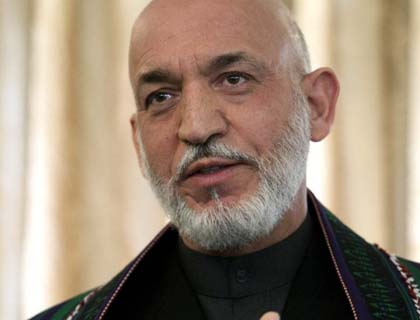KABUL - President Hamid Karzai warned Tuesday that the US-led foreign military in Afghanistan risks becoming an "occupying force" if air strikes which cause civilian casualties continue.
In some of his strongest remarks yet, Karzai harked back to Afghanistan's long history of "dealing with occupying forces" such as the Soviet Union and reiterated that bombing the homes of ordinary Afghans was now "banned."
The outspoken comments came after he issued a "last warning" on Sunday to foreign forces over civilian casualties, following the killing of what he said were 14 innocent Afghans in an air strike.
Karzai said such strikes are not acceptable, and Afghanistan is willing to take "unilateral" action against NATO if they continue.
"From this moment, airstrikes on the houses of people are not allowed," Karzai told reporters in Kabul.
He said he has repeatedly stressed to Afghanistan's international allies that deadly airstrikes that claim civilian lives are not acceptable and said if they don't stop, "the Afghan government will be forced to take unilateral action."
It wasn't clear what actions, if any, Karzai, could take against NATO.
Karzai's relationship with the West has become increasingly strained in recent years, with the controversy over civilian casualties a key factor as US-led efforts to put down a nearly 10-year Taliban insurgency intensify.
NATO's International Assistance Force (ISAF) insists it does all it can to limit such deaths.
"If after the Afghan government said the aerial bombing of Afghan houses is banned and if it continues, then their presence will change from a war against terrorism to an occupying force," Karzai told a news conference in Kabul.
"And in that case, Afghan history is witness to how the Afghans deal with occupying forces."
This was an apparent reference to historic Afghan defeats of foreign invaders, including the Soviet Union, which entered Afghanistan in 1979 and withdrew 10 years later.
Karzai added: "Bombing Afghan houses is banned."
The incident which triggered Karzai's comments -- Saturday's bombing of a compound in the troubled southern province of Helmand -- left 14 civilians including 11 children dead, according to the president.
Karzai also told the news conference that he would be talking to international military leaders and would specify then what action he would take to prevent further aerial bombings of civilian targets.
"As soon as we meet, probably next Sunday, this will be given to them in clear words, that is what we have in mind," he said.
Afghan analysts warn, however, that Karzai can do very little to prevent Western air strikes despite jockeying for domestic support.
"Karzai has already warned international troops several times," said one, Ahmad Saeedi.
"This is not the first warning and will not be the last -- he is just doing it to win the support of people and calm those who are angry over the air strikes by foreign troops.
"He doesn't have the possibilities or means to enact his threat."
Saeedi highlighted that Karzai himself was unpopular and reliant on foreign aid and military support.
Rather than carrying out air strikes in Afghanistan, Karzai charges that the war on terrorism should be fought in neighbouring Pakistan, where the Taliban and Al-Qaeda networks have rear bases, and the CIA conducts a covert drone war.
During a visit to Afghanistan on Monday, Canadian Prime Minister Stephen Harper said the country "is no longer a source of global terrorism". (AFP)

